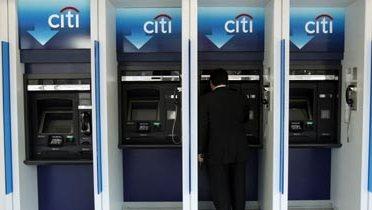Now that the comprehensive financial reform bill is close to passing, there are disturbing signs of counter-productive piling on going on. Two examples are a proposal by Senator Harkin to limit ATM fees to 50 cents per transaction and other proposals to impose interest rate ceilings on credit cards (or to let the states do so). Both seem to be pro-consumer while ostensibly adding to the punishment of the banking industry. But both are bad ideas on economic grounds, and would in fact harm consumers by cutting access to ATMs and further reducing the availability of consumer credit. Furthermore, each idea has nothing to do with rectifying the causes that led to the crisis.
Of course, banks are highly unpopular these days, especially the largest ones that look to be too big to fail and are now making money again while the nation continues to suffer the after-effects of the Great Recession. The public and policy makers are justifiably upset over having to front money (via the Troubled Asset Relief Program) to the big banks, even if most of it will be paid back. They rightly want assurances that regulation of banks will be improved so that something like this doesn’t happen again. Both the comprehensive reform bill already passed by the House and the broad contours of the bill that passed the Senate Banking Committee that is now being debated on the Senate floor would do a reasonably good job of reducing the likelihood and possibly the severity of future crises.
But in the effort to accomplish this critical important objective, it is also tempting to punish banks – even those that did not contribute to the crisis – for unrelated things. After all, large reform legislation like the bill about to be adopted only comes along once every 10 or 20 years. This affords unique opportunities for elected officials to add bells and whistles that have nothing to do with the purpose of the legislation or worse, would have damaging or counterproductive economic consequences.
Especially dangerous are proposals that appeal to popular distrust or anger, but on closer examination, are misguided. The proposed caps on ATM fees and credit card interest rates fall into this category.
Of course, no one likes paying ATM fees or interest rates on credit cards. In fact, if we could get away with it, everyone would like all products and services that we now pay real money for to be free.
But that’s not how things work in a market economy. As the expression goes, there is no such thing as a free lunch. Goods and services cost money to produce or deliver, and the prices their providers charge are the incentives firms have to offer them. (This is true even on the Internet, where so many things appear to be free, but only because they are advertiser-supported, and eventually all of us, as consumers, pay those who pay the advertisers).
Government has cause to intervene in the price-setting process only under two conditions: when markets are monopolized by a single provider (think of your local electric utility) or when providers collude to set prices (which the antitrust laws punish). Neither condition applies to the banking system, despite the growing concentration of deposits nationwide among banks and the consolidation of many banks.
But why, you might ask, should banks charge you to take your own money out of your account through an ATM? Seems unfair, doesn’t it? But on second thought, it turns out that you don’t pay any transaction fee to take money out of your own bank, as is true with more than half of all ATM transactions. You only get charged if you are not near a branch of your bank and you want the convenience of taking money from another bank’s ATM, or an ATM owned by a third party (such as a grocery store, gas station or airport). If Congress caps what those third parties can charge, there won’t be as many ATMs and consumers will have fewer alternatives for getting cash.
It is not an accident that since ATM owners were permitted to charge for convenience, the numbers of ATM have exploded, from about 150,000 to over 400,000 nationwide. The Harkin amendment, if adopted, would reverse this progress, and lead to a shrinkage – most likely a massive one – in the numbers of ATMs deployed. This will only hurt consumers, not help them. [1]
Two different proposals that would have the effect of capping credit card interest rates would also hurt consumers. Senators Whitehouse, Merkley, Durbin, Sanders, Levin and Burris have circulated a proposed “Consumer Credit Amendment” that would reverse a Supreme Court ruling of more than 30 years ago (Marquette National Bank v. First of Omaha Corporation) and authorize states to set maximum credit card interest rates (even on credit cards issued by nationally chartered banks) for their residents. Senators Sanders and Leahy also have an amendment that would authorize the new consumer financial regulatory agency to impose a 15 percent limit on the credit card interest rates. This proposal is even tighter than the 18 percent limit once proposed by former Senator D’Amato in the early 1990s. [2]
Like the proposed limit on ATM fees, a cap on credit card interest rates may seem like it is pro-consumer. But lending interest rate limits of any form inevitably would cause issuers of credit cards to further ration credit, at a time when many issuers have already cut credit lines because of concerns over the creditworthiness of borrowers in the wake of the recession. Of course, some consumers are over-extended and shouldn’t be borrowing any more money. But enacting laws which induce banks to further tighten credit – not only to consumers, but to many businesses and entrepreneurs who rely on credit cards for financing — at a time when the economy is just beginning to show some life runs great risks of snuffing out the recovery.
I am old enough to remember when President Jimmy Carter merely suggested in 1980 that consumers not spend so freely with their credit cards, and government regulators then followed up with tighter rules on credit card issuance. The economy quickly dropped like a stone at an unprecedented 10 percent annual rate for a quarter. It goes without saying that our economy doesn’t need a rerun of anything even remotely close to that experience.
The proposal by Senator Whitehouse and his co-sponsors to permit states to set their own interest rate ceilings seems less threatening, since it would not apply nationwide. That’s one small comfort. But this particular amendment could lead to a crazy quilt system where consumers living in different states, but otherwise with the same or similar credit records, could be charged very different interest rates. As a result, consumers and businesses in states with tighter caps would lose business to states that more sensibly choose not to regulate credit card rates or regulate them less aggressively. One would think, therefore, that voters and elected officials would realize this and refrain from imposing tight credit card interest rate limits. But in the current anti-bank political environment, anything is possible anywhere. If Congress is truly interested in not curtailing credit at this critical time, it should not overrule what the Supreme Court so wisely decided a generation ago: a national market in credit card lending is preferable to one that is potentially balkanized and much more restrictive.
Finally, the proposed ATM and credit card amendments have nothing to do with the main thrust of the comprehensive reform bills, which is to prevent future financial crises. The amendments are unrelated ornaments that may appear sensible on the surface but in reality would hurt the consumers (and possibly many businesses) they are ostensibly designed to protect.
Robert E. Litan is a Senior Fellow in Economic Studies at the Brookings Institution and the Vice President of Research and Policy at the Kauffman Foundation.
_________________________________________
[1] In 1999, I authored a study for the American Bankers Association opposing proposals then to cap ATM fees. Since that study, the numbers of ATMs have continued to climb. My views on such caps have remained unchanged.
[2] In 1992, I authored a study for Visa and Mastercard explaining why Senator D’Amato’s proposal would significantly curtail the availability of credit card lending. My views on this topic also have not changed since.


